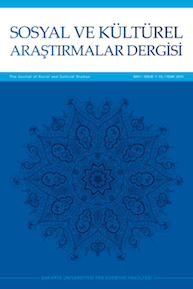Skopos Kuramını Yeniden Anlamak: Skopos Kuramında Amaç Kavramına Geniş Ölçekli Bir Bakış
Çeviribilimde etkin bir rol oynayan Skopos kuramı çeviride erek odaklılığı öne çıkaran bir kuram olmakla birlikte, kuramın bilimsel anlamda ağırlık noktasını çeviride amacı öncelemesi oluşturmaktadır. Kuramın öncüsü olan Alman çeviribilimci Hans J. Vermeer’in (1984) çevirinin hedef ve/veya amacını çeviribilim terminolojisi bağlamında Yunanca “Skopos”’ kavramı ile karşılaması tesadüf değildir. Bu çalışmada Yunanca hedef anlamına gelen Skopos’un kökeni, ilk anlamı ve tarihi serüveninde uğramış olduğu anlamsal değişiklikler ele alınacak olup, çeviribilim alanında çok tartışılan bir kuram olan Skopos kuramıyla ilgili yanlış anlama ve uygulamalar farklı bir bakış açısıyla irdelenecektir. Yine bu çalışmayla kavramsal köklerine inilmeksizin genel olarak ereklilik (finalistik) bağlamıyla değerlendirilen ve salt amaca yönelik anlaşılan Skopos kuramının, sadece erek metin üzerinden bir amaçla anlaşılamayacağının ve şimdiye dek süregelen yanlış anlaşılmasının düzeltilmesi amaçlanmaktadır.
Anahtar Kelimeler:
Skopos, telos, erek, amaç, hedef, çeviribilim, Aristoteles, Stoacılık
Reunderstanding of Skopos Theory: A Large Scale View to the Consept of Purpose in Skopos Theory
Skopos theory playing an active role in Translation Studies has a target oriented approach. This theory focuses and prioritizes the purpose in translation in terms of scientific orientation. It is not a coincidence that Hans J. Vermeer (1984) who is a German Translation Studies scholar and the pioneer of this theory chose the Greek concept “Skopos” as the equivalent of the target and/or purpose in terms of translation studies. The concept of Skopos meaning target in Greek, its etymology, its original meaning and its semantic changes occured throughout history are going to be held, and misunderstandings and misapplications related to Skopos theory are going to be examined with a different perspective in this article. This article aims at correcting the misunderstanding of Skopos theory evaluated with its finalistic context without examining its conceptual roots and understood as a term referring to the purpose, and claims that this theory cannot be understood merely as a purpose on the basis of target text
___
- Alpers-Gölz, Roswitha (1976). Der Begriff Skopos in der Stoa und se- ine Vorgeschichte Georg Olms Verlag, Hildesheim.
- Dizdar, Dilek (1999). “Skopostheorie” Handbuch Translation için- de, S:104-107, Stauffenburg Verlag
- Prunč, Erich (2002). Einführung in die Translationswissenschaft- Selbstverlag, Graz.
- Reiss. K; Vermeer, H.J (1984). Grundlegung einer allgemeinen Trans- lationstheorie Max Niemeyer Verlag, Tübingen.
- Tosun, M (2002). Çeviribilim Kuramlarının Uyduğu Gelişme Çizgisi- nin Çeviri Eğitimine Yansıması (Paradigma Değişiminin Karakte- ri), Yayınlanmış Doktora Tezi, İstanbul Üniversitesi
- Vermeer, H.J. (1978). Ein Rahmen für eine allgemeine Translationsthe- orie Lebende Sprachen, Sayı 23, No: 3, Sayfa: 99-102.
- Vermeer, H.J. (1990). Skopos und Translationsauftrag- Aufsätze Insti- tut für Übersetzen und Dolmetschen der Universität Heidel- berg, Heidelberg.
- Vermeer, H.J. (1989). Skopos And Commission In Translational Ac- tion, Lawrence Venuti (2000) The Translation Studies Reader Routledge, London
- ISSN: 2149-2778
- Yayın Aralığı: Yılda 2 Sayı
- Başlangıç: 2015
- Yayıncı: Sakarya Üniversitesi
Sayıdaki Diğer Makaleler
Aleviliğin Menşei Olan Şiâ’nın Ortaya Çıkışını Etkileyen Tarihsel Olaylar
Eski Yakındoğu Kanunname Kültürü Işığında Yahudilikte Ahit Anlayışı
Uluslararası Afyon Anlaşmalarında Osmanlı İmparatorluğu
Skopos Kuramını Yeniden Anlamak: Skopos Kuramında Amaç Kavramına Geniş Ölçekli Bir Bakış
Nesrin ŞEVİK, Mehmet GÜNDOĞDU, Muharrem TOSUN
SOSYAL VE KÜLTÜREL ARAŞTIRMALAR DERGİSİ (SKAD)
Kürt-Nasturi İlişkileri ve Ağa Petros’un “Özerk Asuri Devleti Projesi” (1919-1923)
The Politics of Writing Islam: Voicing Difference, Bloomsbury Academic/Continuum
